美国的律师资格考试
美国纽约州律师资格考试各科提纲 -- 职业伦理规范
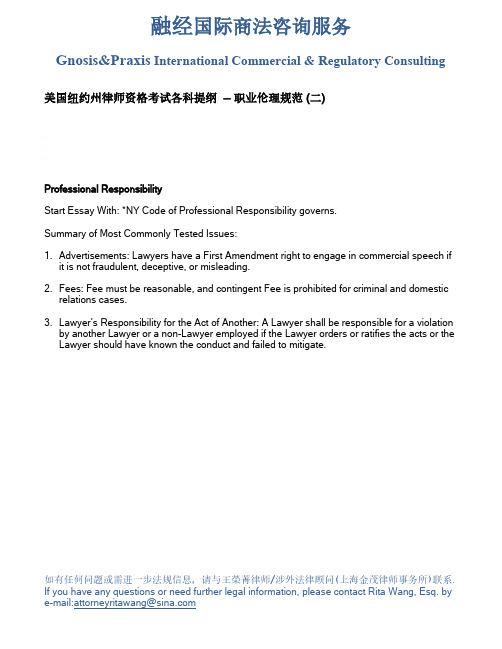
美国纽约州律师资格考试各科提纲 -- 职业伦理规范 (二)Professional ResponsibilityStart Essay With: *NY Code of Professional Responsibility governs.Summary of Most Commonly Tested Issues:1.Advertisements: Lawyers have a First Amendment right to engage in commercial speech ifit is not fraudulent, deceptive, or misleading.2.Fees: Fee must be reasonable, and contingent Fee is prohibited for criminal and domesticrelations cases.wyer’s Responsibility for the Act of Another: A Lawyer shall be responsible for a violationby another Lawyer or a non-Lawyer employed if the Lawyer orders or ratifies the acts or the Lawyer should have known the conduct and failed to mitigate.如有任何问题或需进一步法规信息,请与王榮菁律师/涉外法律顾问(上海金茂律师事务所)联系.如有任何问题或需进一步法规信息,请与王榮菁律师/涉外法律顾问(上海金茂律师事务所)联系.如有任何问题或需进一步法规信息,请与王榮菁律师/涉外法律顾问(上海金茂律师事务所)联系.如有任何问题或需进一步法规信息,请与王榮菁律师/涉外法律顾问(上海金茂律师事务所)联系.如有任何问题或需进一步法规信息,请与王榮菁律师/涉外法律顾问(上海金茂律师事务所)联系.I.Regulation of the Legal ProfessionA.Inherent Powers of Courts to Regulate Lawyers: Courts have inherent powers to regulate lawyers.plaints Involving Lawyer Conduct:a)Investigated by the Departmental Disciplinary Committee: Filing a complaint isprivileged and followed by a non-public hearing.b)Malpractice does not necessarily mean that there is a conduct appropriate for discipline.2.Types of Discipline That May be Imposed:a)Disbarment.b)Suspension.c)Public or private censure.d)Letter of admonition.B.Admission to the Profession:1.State Requirements for Admission to Bar Need to be Rationally Related to the Practice of Law:a)Graduation from American Bar Association (ABA) law school, orb)*NY:(1)1 year of law school and study in *NY office under a licensed Lawyer and subject totheir supervision for an aggregate total of 4 years, and(2)Must take oath to uphold State and Federal Constitutions.2.Cannot require US citizenship or *NY resident.3.Examination Requirement:a)Pass bar exam and MPRE, orb)Without Examination:(1)Graduated ABA law school, and(2)Admitted to bar in another state and that state would admit *NY Lawyer withoutexamination, and(3)Practiced law for at least 5 of last 7 years proceeding application.c)To Apply for Bar Exam:(1)Truth and Full Disclosure: Burden on applicant to show good moral character.(2)Duty to cooperate.C.Regulation after Admission:wyers are Regulated by the Highest State Court Through its Agencies:a)Lawyers should not violate laws or disciplines.b)Lawyers cannot unlawfully discriminate in the practice of law on the basis of race, sex,sexual orientation, age, marital status, and etc.2.Multi-Jurisdictional Practice:a)Discipline by one state does not mean there will be discipline in another, but most stateswill give full faith and credit to other states decision.b)Choice of Law in Multi-Jurisdictional Matters:(1)If Licensed in *NY: Only *NY law applies.(2)Admitted in *NY and Another State: Rules of the state where Lawyer principallypractices are used.(a)U nless the conduct’s key effect is in another state, then apply that state’s rules. D.Maintaining Professional Standards Including Peer Responsibility: Admitted lawyers have如有任何问题或需进一步法规信息,请与王榮菁律师/涉外法律顾问(上海金茂凯德律师事务所)the duty to report and testify when he knows of a violation.1.Not anonymously.2.Cannot Violate a Rule and Try to Fix it Later:a)Lawyer that threatens to report another Lawyer who violates rule if he does not remedyhis wrong will be disciplined.b)Confidentiality trumps duty to report if the Lawyer is a client. In this case, the Lawyer stillcannot recommend his client-Lawyer for admission in another state.E.Unauthorized Practice of Law: Lawyer cannot practice in a jurisdiction where he is not authorized unless he has a permissible temporary practice.1.Activities Constitute Practicing Law and Thus Require a Lawyer:a)Providing legal advice.b)Taking depositions.c)Appearing in court for a client.d)Negotiating settlement.e)Approving a legal document.2.Tasks That do not Require License:a)Non-Lawyer under the supervision of a senior Lawyer.b)Where professional judgment is not required.3.Permissible Temporary Practice:a)Associate with an active local Lawyer.b)Pro Hac Vice: Special permission for a specific case.c)Mediation/arbitration out of home-state practice.d)Anything reasonably related to Lawyer’s home state practice.4.Multi-State Firms: Lawyer may only practice where admitted and firm letterhead must indicate his state of admission.F.Fee Division With a Non-Lawyer: Lawyer cannot be partner with non-Lawyer if any part of the partnership involves the practice of law.1.Generally, Lawyer should never divide a legal fee with a non-Lawyer unless payments are:a)In the forms of salaries, retirement plans, bonuses, or profit sharing.b)For spouses of deceased partners the fees earned by deceased partner.wyer and non-Lawyer can share office as long as the space is physically separated.a)The separation has to appear to be separated to the public.b)Lawyer must take precautions to insure non-Lawyer clients are not coerced to useLawyer for legal matters.G.Fee Division With a Lawyer:1.This rule does not prohibit payment to a Lawyer formerly associated in a law firm pursuant to a separation or retirement agreement.2.A Lawyer shall not divide a fee for legal services with another Lawyer who is not associated in the same law firm unless:a)The division is in proportion to the services performed by each Lawyer or, by a writinggiven to the client, each Lawyer assumes joint responsibility for the representation,b)The client agrees to employment of the other Lawyer after a full disclosure that adivision of fees will be made, including the share each Lawyer will receive, and the client’s agreement is confirmed in writing, andc)The total fee is not excessive.如有任何问题或需进一步法规信息,请与王榮菁律师/涉外法律顾问(上海金茂凯德律师事务所)w Firm and Other Forms of Practice:w Firm: A law firm shall make reasonable efforts to ensure that all lawyers in the firm conform to the disciplinary rules.2.Other Forms of Practice:a)A supervisory Lawyer shall make reasonable efforts to ensure that the other Lawyerconforms to the disciplinary rules.b)Lawyer shall be responsible for a violation by another Lawyer or a non-Lawyeremployed if:(1)The Lawyer orders or ratifies the acts.(2)The Lawyer should have known the conduct and failed to mitigate.c)Lawyer is liable for his misconducts notwithstanding that the Lawyer acted at thedirection of another person.d)A subordinate Lawyer is not liable if that Lawyer acts in accordance with a supervisoryLawyer’s reasonable resolution of an arguable question of professional duty.I.Contractual Restrictions on Practice:1.Non-Compete Agreements are Prohibited with Exceptions: Lawyer should not enter an agreement to restrict the right of another to practice law after the termination of a relationship created by the agreement, except as a condition to payment of retirement benefits.2.Settlement: Lawyer shall not enter into an agreement that restricts the right of a Lawyer to practice law.J.Responsibilities and Contractual Relationships Regarding Non-Legal Services:wyer subject to these disciplinary rules with respect to non-legal services if:a)Client could reasonably believe that the non-legal services are the subject of theLawyer-Client relationship.b)Lawyer treats his non-legal services like legal services.2.It will be presumed that the person receiving non-legal services is the subject of Lawyer-Client relationship unless:a)Lawyer has advised the client in writing that the services are not legal services and thatthe protection of a Lawyer-Client relationship does not exist with respect to the non-legal services, orb)The interest of the Lawyer in providing services is de minimis.II.The Lawyer-Client RelationshipA.Acceptance or Rejection of Clients:1.Consensual: Lawyer can decline to represent someone, but he should not decline a client’s case just because client’s side is unpopular.wyer Must Reject Certain Cases:a)Lawyer is unable to provide adequate legal services.b)Actions are intended to harass or interposing party.c)Client is already represented by another counsel.d)Other lawyers within the firm are prohibited from taking the case.e)Representation would result in violation of disciplinary rule (e.g. conflict of interest).f)Lawyer cannot accept or continue employment if his professional judgment would beaffected by his own financial, business, property, or other personal interest, unless adisinterested Lawyer would believe that the representation of the client would not be如有任何问题或需进一步法规信息,请与王榮菁律师/涉外法律顾问(上海金茂凯德律师事务所)adversely affected and the client consent after full disclosure.B.Scope, Objective and Means of the Representation:1.Scope: A Lawyer may serve simultaneously as both advocate and adviser, and a Lawyer has duty to zealously represent a client.a)Lawyers as Advocate: Can apply most favorable construction to the fact that the clientgives you, so long as not frivolous.b)Lawyer as Adviser: Has duty to give professional opinion as to likely decision of thecourt and the result or effect of that decision.2.Objective:a)Client Decision:(1)General Rule: The client makes all decisions that affect the merits of the case or willsubstantially prejudice the client's rights.(2)Examples:(a)Whether to commence a suit.(b)Whether to plead an affirmative defense.(c)Whether to settle.(d)Whether to testify at trial.(e)Whether to plead guilty.(f)Whether to elect for jury trial.(g)Whether to file an appeal.(h)Whether to join a party to the lawsuit(3)Lawyer must abide by clients wishes, unless it would be illegal, unethical, or immoral.b)Lawyer Decision:(1)General Rule: Lawyer makes all decisions that are procedural in nature.(2)Examples:(a)Adjournment.(b)Whether to conduct discovery.(c)What kind of discovery to conduct.(d)Venue.3.Means of the Representation:a)If client is minor or client becomes incapacitated, then Lawyer must get a guardianappointed.b)Lawyer must respect the client and include client in the process of making decisions asmuch as possible.C.Within the Bounds of the Law:wyer’s Conduct Has to be Within the Bounds of the Law:a)Only make good faith argument.b)Cannot assert a frivolous claim, which means claims that he knows is not true.D.Withdrawal: The client has the power to terminate the Lawyer-client relationship in disregard of the circumstances, and a Lawyer may withdraw when there is good reason and material harm to the client.wyer Must Request Withdrawal When:a)Lawyer knows client’s purpose is frivolous and will cause harassment.b)Lawyer leads to a violation of the Code, including his service being used to perpetrate acrime or fraud.如有任何问题或需进一步法规信息,请与王榮菁律师/涉外法律顾问(上海金茂凯德律师事务所)c)Client fires the Lawyer.d)Lawyer becomes impaired physically or mentally.wyer May Request Withdrawal When:a)Lawyer’s withdrawal can be accomplished without material adverse effect on interests ofclient.b)Client’s claim or defense is frivolous.c)Client persists in a course of action involving Lawyer’s services that the Lawyerreasonably believes is criminal or fraudulent.d)Client insists that Lawyer pursue a course of conduct that is illegal or prohibited by Code.e)Other conduct makes it unreasonably difficult for Lawyer to carry out employmenteffectively.f)Client insists that the Lawyer engage in conduct that is contrary to the judgment andadvice of the Lawyer, even if the conduct is not prohibited by Code and the matter is not pending before the court.g)Client deliberately disregards agreement of obligation to the Lawyer as to fees orexpenses.h)La wyer’s inability to work with co-counsel indicates that the best interest of the client isserved by withdrawal.i)Client knowingly and freely agrees to termination.j)Other good cause.wyer may continue in the representation of his client even though his client has elected to pursue a course of conduct contrary to the advice of the Lawyer so long as the Lawyer does not knowingly assist the client to engage in illegal conduct or to take a frivolous legal position.4.Methods of Withdrawing:a)Must obtain court's permission to withdraw if matter is in litigation.b)Lawyer must withdraw in a way that does not prejudice the client(1)Must return client's property promptly.(2)Must provide client with reasonable notice.E.Statement of C lient’s Rights, Engagement Letters and Retainer Agreements:1.Statement of C lient’s Rights:a)For domestic relations matter, client must be provided with statement of client rights andresponsibilities at the initial conference and prior to signing of a written retainer agreement.b)Fee agreement must be in writing and signed by Lawyer and client.2.Engagement Letters:a)General Rule: To represent a client for fees over $3,000, a Lawyer shall provide to theclient a written letter of engagement before or within a reasonable time of commencement with the following exceptions.(1)Service is of the same general kind previously provided to client.(2)Services involve domestic relations matter, where a specific letter is required.b)The letter of engagement shall address the following matters:(1)Explanation of the scope of the legal services to be provided,(2)Explanation of Lawyer's fees to be charged, expenses and billing practices.c)Engagement letters can be substituted by retainer agreement.3.Retainer Agreements: Retainer agreement must include the following.如有任何问题或需进一步法规信息,请与王榮菁律师/涉外法律顾问(上海金茂凯德律师事务所)a)Scope of legal services to be provided.b)Explanation of fees charged.c)Expenses and billing practice.d)Notice of client rights to arbitrate a fee dispute.F.Fees:1.Duty to Explain Fully the Reasons for Fees:a)Fee Must be Reasonable: There is no minimum or maximum fee.b)Factors of Reasonableness:(1)Time and labor.(2)Novelty and difficulty of questions involved.(3)Requisite skill to perform legal services.(4)Customary fee within locality for similar work.(5)Experience, ability and reputation of Lawyer.(6)Interference with other employment by Lawyer.(7)Time limitations imposed by client or circumstance.(8)Whether fee is fixed or contingent.2.Contingent Fee is Prohibited for:a)Criminal case.b)Quasi-criminal case.c)Domestic relations case.3.Domestic Relations Matter:a)Domestic Relations Matter Include:(1)Divorce, separation, annulment, custody, visitation, maintenance, child support, andalimony.(2)Preliminary hearing, enforcement, judgment, modification, appeals.b)Requirements of Engagement Letter: Fee agreement must be in writing and signed byLawyer and client.c)Client must be provided with statement of client rights and responsibilities at the initialconference and prior to signing of a written retainer agreement.d)Prohibitions:(1)Non-refundable fees.(2)Contingency fee to collect unpaid alimony or child support.e)Periodic Billing:(1)Must send out bill every 60 days and at conclusion of case.(2)Lawyer must send back any unused portion of retainer.G.Mediation of Lawyer-Client Disputes: Mediation is a process in which a moderator does not issue a ruling but helps guide clients and lawyers toward a non-binding resolution. States should offer mediation as an alternative to arbitration but does not require parties to mediate.H.Fee Arbitration:1.Fee disputes must be resolved by arbitration at election of client.2.If both the fee arbitration and the legal malpractice action shared at the core claims of Lawyer malpractice, then the client is barred from later bringing the malpractice claim to court.I.Sale of Law Practice: A Lawyer retiring from a private practice of law or the personal representative of a deceased, disabled or missing Lawyer, may sell a law practice.1.Confidences and Secrets: The seller may provide the prospective buyer with the following如有任何问题或需进一步法规信息,请与王榮菁律师/涉外法律顾问(上海金茂凯德律师事务所)information of an individual client.a)Concerning the identity of the client,b)Concerning the status and general nature of the matter,c)Available in public court files, andd)Concerning the financial terms of the Lawyer-client relationship and the payment statusof the client's account.2.Written notice of the sale shall be given jointly by the seller and the buyer to each of the seller's clients and shall include information regarding:a)The client's right to retain other counsel or to take possession of the file,b)The fact that the client's consent will be presumed if the client does not reply within 90days , subject to any court rule or statute requiring express approval by the client ,c)The fact that agreements between the seller and the seller's clients as to fees will behonored by the buyer,d)Proposed fee increases, if any, andIII.The identity and background of the buyer or buyers, including principal office address, bar admissions, number of years in practice in the state, whether the buyer has ever been disciplined for professional misconduct or convicted of a crime, and whether the buyer currently intends to re-sell the practice.IV.Privilege and Confidentialitywyer-Client Privilege and the Work Product Doctrine:wyer-Client Privilege: Confidential communication between Lawyer and client made during professional legal consultation will be privileged unless the privilege is waived by the client or an exception applies.2.Work Product Doctrine:a)The work product of Lawyer is not discoverable unless the court determines that denialof discovery will be unfairly prejudicial.b)Work Product: Any writing that reflects a Lawyer's opinions, legal research or theoriesshall not be discoverable under any circumstances.B.Professional Obligation of Confidentiality:1.Definition:a)Confidential information includes information gained during or relating to therepresentation of a client, whatever its source, that is:(1)Protected by the attorney-client privilege,(2)Likely to be embarrassing or detrimental to the client, or(3)Information that the client has requested be kept confidential.b)Confidential Information does not Ordinarily Include:(1)A Lawyer’s legal knowledge or legal research, or(2)Information that is generally known in the local community or in the trade, field orprofession to which the information relates.2.General Rule: A Lawyer shall not knowingly reveal confidential information, use such information to the disadvantage of a client or for the advantage of the Lawyer or a third person.3.Exceptions to Confidentiality:a)If client gives informed consent, then Lawyer can reveal confidential information: Client’s如有任何问题或需进一步法规信息,请与王榮菁律师/涉外法律顾问(上海金茂凯德律师事务所)consent has to be after Lawyer’s full disclosure of material facts.b)If the disclosure is impliedly authorized to advance the best interests of the client and iseither reasonable or customary in the professional community, then the confidentialinformation can be revealed.c)A Lawyer may reveal or use confidential information to the extent that the Lawyerreasonably believes necessary:(1)To prevent reasonably certain death or substantial bodily harm,(2)To prevent the client from committing a crime,(3)To withdraw a written or oral opinion or representation previously given by the Lawyerand reasonably believed by the Lawyer still to be relied upon by a third person, wherethe Lawyer has discovered that the opinion or representation was based on materially inaccurate information or is being used to further a crime or fraud,(4)To secure legal advice about compliance with these rules,(5)To defend the Lawyer or his associates against an accusation of wrongful conduct, orto establish or collect a fee, or(6)To comply with other law or court order.4.Obligations apply even when no client-Lawyer relationship ensues after a Lawyer has discussions with a prospective client about the possibility of forming a client-Lawyer relationship.V.Independent Professional Judgment and Conflicts of InterestA.As Affected by Lawyer's Personal Interest: Lawyer should avoid any conflicts and exercise independent professional judgment.1.In the event his independent professional judgment may be influenced by his personal interest, Lawyer should withdraw or not accept the representation, unless a disinterested Lawyer would believe that the representation of the client will not be adversely affected thereby and the client consents to the representation after full disclosure of the implications of the Lawyer’s interest.2.Look for his obligations to himself, client, and the firm.3.Gifts and Bequests: Lawyer should not prepare an instrument that grants a gift or bequest to him.4.Lending money to Clients is prohibited when related to litigation, but Lawyer may advance the cost of litigation for the client as long as client pays back.wyer as Witness: Lawyer may not be a witness on a significant issue where he is representing one of the parties with the following exception.1.Uncontested matter,2.Formality of a matter, (e.g. whether client signed a will)3.Where the testimony pertains to the nature and value of legal services in a case, or4.There will be a substantial hardship to for the client.C.Acquiring an Interest in Litigation: Lawyer cannot take interest in the subject matter of litigation.1.Interest in publication rights related to case subject matter is prohibited.wyer cannot take a mortgage on a client’s property to secure a feeD.Entering into Business Transactions With Client: Doing business with client is prohibited, unless it is fair to client.如有任何问题或需进一步法规信息,请与王榮菁律师/涉外法律顾问(上海金茂凯德律师事务所)1.To Ensure a Fair Transaction:a)Client should be advised to get independent counsel.b)Client must consent in writing.c)All terms must be fully disclosed in writing in a manner reasonably understandable to theclient.2.Standard commercial or other ordinary transactions are allowed.3.Only lawyers can be partners if involves the practice of law.E.Conflicting Interests Including Prospective Clients, Current Clients and Former Clients:1.General Rules Regarding Representation of Multiple Clients:a)Permissible to represent multiple clients provided their interests are not adverse.Represent each client zealously and present only meritorious claims or contentions.b)In the Event of an Actual Conflict: Lawyer cannot represent clients whose interestsactually conflict.c)In the Event of a Potential Conflict: Representation may be appropriate in the followingsituations.(1)Clients consent after full disclosure,(2)A disinterested Lawyer would believe that the Lawyer can competently represent theinterest of each client, and(3)The Lawyer must withdraw if an actual conflict arises.2.Confidential Information: Lawyer cannot use confidences of one client to assist another.wsuits Between Current and Former Clients:a)Lawyer can represent a current client against a former client.b)Exceptions:(1)Current client wants to sue former client involving a matter in which Lawyerrepresented the former client, or(2)When representing former client, Lawyer learned confidential information that isrelevant in action by the current client.(3)If the information is no longer confidential or the client consents, then Lawyer mayrepresent the current client.wsuits Between Current Clients: Lawyer can never represent current client against current client.F.Influence by Persons Other Than Client: A Lawyer can be paid by a third party with the following conditions.wyer takes instructions from Client, not Payor.2.The client consents to the payment arrangement, andwyer keeps the confidences of the client and does not reveal them to a third party.G.Imputed Disqualification:1.General Rule: While lawyers are associated in a law firm, none of them shall knowingly accept or continue employment when any one of them practicing alone would be prohibited from doing so.2.Exception: Imputation rule does not apply if the prohibited Lawyer’s adverse interest is his sexual relationship incident to any professional representation by the Lawyer or the L awyer’s firm.wyer's Service as Arbitrator, Mediator or Judge:1.Judge: Former judge or government employee in private practice may not accept a case如有任何问题或需进一步法规信息,请与王榮菁律师/涉外法律顾问(上海金茂凯德律师事务所)which involves the same matter if he worked on it personally and substantially with the government.2.Arbitrator and Mediator:a)Lawyer can serve as an impartial arbitrator or mediator in matters which involve presentor former clients after disclosing such relationship.b)A Lawyer who has worked as an arbitrator or mediator should not thereafter represent inthe dispute any of the parties involved.anization as Client:1.If Lawyer represents a corporation, the corporation is the client, not the officers, directors, shareholders, or employees.a)Lawyer can be a director, but no confidential privilege at Board meetings.b)Lawyer has Duty to Report Security Violations.(1)Report up chain of command to CEO.(2)If the appropriate response is not taken, then Lawyer should report to the Board andmay report outside.(3)May reveal confidential information to the extent necessary to protect the client, inthis case the corporation.c)Any measure taken shall be designed to minimize disruption of the organization and therisk of revealing confidential information to persons outside the organization.2.Representing the Insurance Company:a)Represent the insured and not the insurance company.b)Confidential information is protected from disclosure to insurance company.c)Insurance company cannot direct case decisions.d)Engagement letter must be sent to both the insurance company and the insured.J.Legal Services Organization: Lawyer can be associated with a not-for-profit legal services organization even if its interest is against his clients. However, the participation should not:1.Be incompatible with his duty of loyalty to a client, or2.Have a material adverse effect on the representation of a client of the organization whose interests differ from those of the clients of the Lawyer or law firm.K.Sexual Relations With Clients: Sex is prohibited as a condition of representation. However, pre-existing sexual relations with clients are allowed.petence, Legal Malpractice and Other Civil LiabilityA.Civil Liability Including Malpractice:1.In addition to disciplinary investigation, a Lawyer may have civil liability such as malpractice claims by his clients. However, malpractice does not necessarily mean that the conduct is appropriate for discipline.2.Malpractice:a)Standard:(1)Lawyer's negligence is the proximate cause of client's injuries or damages.(2)Admission of guilt by client does not absolve malpracticeb)Standard of skill(1)General Practitioner: Lawyer is held to the same degree of skill, prudence anddiligence possessed by general practitioner’s ordinary skill.(2)Specialist: A Lawyer who holds himself out as a specialist in that field is held to the如有任何问题或需进一步法规信息,请与王榮菁律师/涉外法律顾问(上海金茂凯德律师事务所)。
加州律考难还是纽约州律考难?详细对比看这里
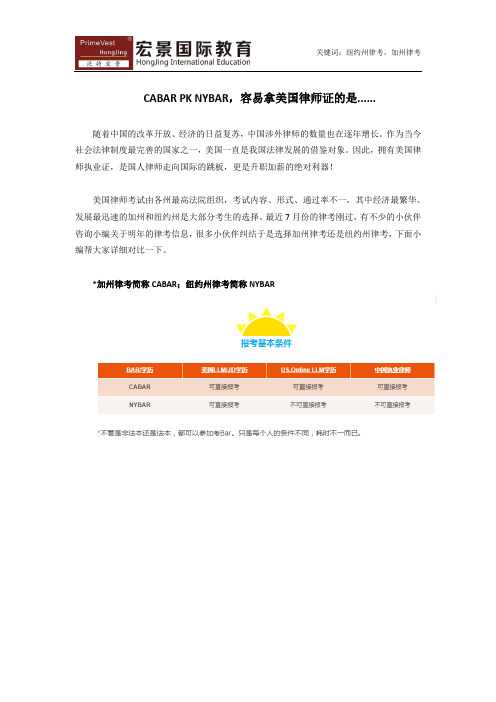
CABAR PK NYBAR,容易拿美国律师证的是......随着中国的改革开放、经济的日益复苏,中国涉外律师的数量也在逐年增长。
作为当今社会法律制度最完善的国家之一,美国一直是我国法律发展的借鉴对象。
因此,拥有美国律师执业证,是国人律师走向国际的跳板,更是升职加薪的绝对利器!美国律师考试由各州最高法院组织,考试内容、形式、通过率不一,其中经济最繁华、发展最迅速的加州和纽约州是大部分考生的选择。
最近7月份的律考刚过,有不少的小伙伴咨询小编关于明年的律考信息,很多小伙伴纠结于是选择加州律考还是纽约州律考,下面小编帮大家详细对比一下。
*加州律考简称CABAR;纽约州律考简称NYBAR*如果考生顺利的通过了BAR Exam,之后还需要通过MPRE(其中纽约州还需要参加NYLE)并宣誓才可以成为美国加州/纽约州执业律师。
美国律师职业道德考试(Multistate Professional Responsibility Examination,简称MPRE)每年可以考三次,分别在三月、八月和十一月,报名费95美金(美国本土、关岛、塞班岛皆有考点),每次考核时间为120分钟,题量为60道选择题,其中加州的美国律师职业道德考试合格分数为86分,纽约州为85分!从考试资格来说,CABAR比NYBAR更兼容,其不但可接受US.Online.LLM报考,还可以接受海外执业律师直接报考;从考试通过率来说,NYBAR要高于CABAR;从含金量来说,二者相同,都是提升职场竞争力的高质量证书。
不管是选择CABAR还是NYBAR,适合自己的才是最好的选择。
小伙伴们,如果您也想去美国当律师,想要更深入透彻的了解加州律师考试、纽约州律师考试等,可在对话栏回复姓名+电话or您的问题,宏景小编将助你一臂之力。
责编:Shelly本文为宏景国际教育原创,转载请注明出处!。
美国纽约州律师资格考试各科提纲 – 不动产法
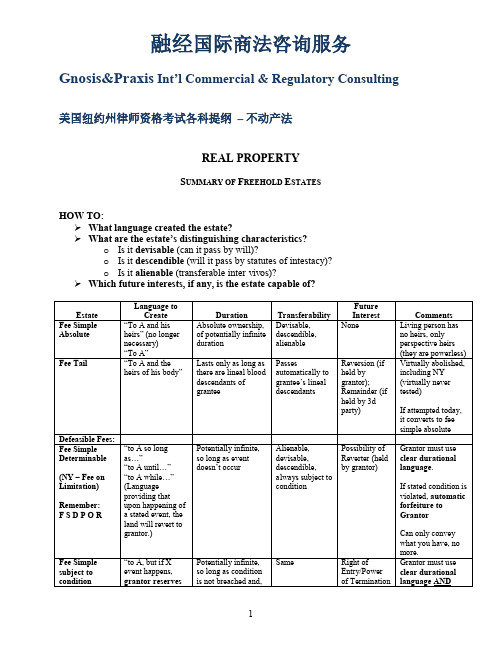
Fee Simple subject to condition
Potentially infinite, so long as condition is not breached and,
Same
Right of Entry/Power of Termination
1
融经国际商法咨询服务
Gnosis&Praxis Int’l Commercial & Regulatory Consulting
2
融经国际商法咨询服务
Gnosis&Praxis Int’l Commercial & Regulatory Consulting
o Reasonable Repairs (may consume natural resources for reasonable repairs and maintenance of premises o Grant (express grant of right) o Exploitation (land suitable only for exploitation) Permissive waste/Neglect o Land allowed to fall into disrepair or life tenant faile to reasonable protect the land Obligation to Repair Life tenant must maintain the premises in reasonably good repair Obligation to Pay Ordinary Taxes Life tenant must pay all ordinary taxes on the land, to the extent of income or profits from the land. If no income or profit, must pay all ordinary taxes to the extent the premises fair rental value Ameliorative waste o Life tenant must not engage in acts that will enhance the property value, unless all future interest holders are known and consent.
【美国律师】美国律考PT90分钟如何安排
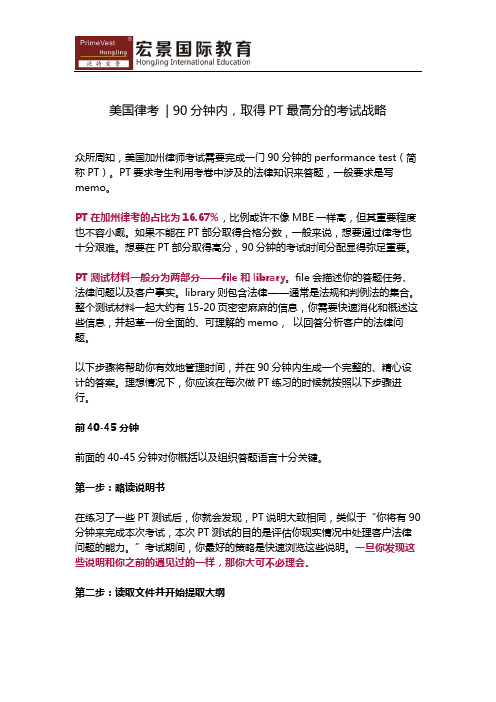
美国律考| 90分钟内,取得PT最高分的考试战略众所周知,美国加州律师考试需要完成一门90分钟的performance test(简称PT)。
PT要求考生利用考卷中涉及的法律知识来答题,一般要求是写memo。
PT在加州律考的占比为16.67%,比例或许不像MBE一样高,但其重要程度也不容小觑。
如果不能在PT部分取得合格分数,一般来说,想要通过律考也十分艰难。
想要在PT部分取得高分,90分钟的考试时间分配显得弥足重要。
PT测试材料一般分为两部分——file和library。
file会描述你的答题任务、法律问题以及客户事实。
library则包含法律——通常是法规和判例法的集合。
整个测试材料一起大约有15-20页密密麻麻的信息,你需要快速消化和概述这些信息,并起草一份全面的、可理解的memo,以回答分析客户的法律问题。
以下步骤将帮助你有效地管理时间,并在90分钟内生成一个完整的、精心设计的答案。
理想情况下,你应该在每次做PT练习的时候就按照以下步骤进行。
前40-45分钟前面的40-45分钟对你概括以及组织答题语言十分关键。
第一步:略读说明书在练习了一些PT测试后,你就会发现,PT说明大致相同,类似于“你将有90分钟来完成本次考试,本次PT测试的目的是评估你现实情况中处理客户法律问题的能力。
”考试期间,你最好的策略是快速浏览这些说明。
一旦你发现这些说明和你之前的遇见过的一样,那你大可不必理会。
第二步:读取文件并开始提取大纲PT的file一般总是以上级律师的备忘录开头,该备忘录描述了你的任务以及客户的法律问题。
一旦你已识别任务(备忘录的论证讨论部分、简要论证部分,写信给客户或对方律师等),你就开始就题目指定的任务概述你的论点,如“DISCUSSION”。
这可以让你的阅卷老师充分了解到你已经明白了你的考试任务。
下一步,将客户涉及的问题写入memo并起草副标题,列如(1)P是否有动机?(2)D是否有防御行为?(注:你也可以将论证部分的内容将被转换为法律论点,例如,(1)P动机背后的行动支持,(2)D没有采取任何防御行为。
去美国当律师,是选CA BAR or NY BAR?

纠结!去美国当律师,选择CA BAR or NY BAR ?通过美国律师考试,成为美国执业律师将增加职场竞争力,并能与国际客户进行合作,专业处理跨境交易。
不仅仅是美国执业,还可以驰骋海外,例如承接国际咨询,国际仲裁,跨国企业法务等!种种优势都体现了美国律师执照的重要性,其中加州律考(CA Bar Examination)和纽约州律考(NY Bar Examination)是大部分人的选择。
有很多律师行业人员咨询小编,加州律考和纽约州律考都不错,我该选哪一个呢?下面小编帮大家详细对比一下。
报考资格加州律考:①美国本土Juris Doctor(JD)或Master of Law(LLM)。
(ABA approved Law School)②获取申请者本国律师执业资格并提交由当司法局或律师协会出具的良好操守证明。
③完成由美国律师协会承认的佛罗里达海滨法学院独家网授课程——Online LLM课程。
*加州不接受其他国家的Online LLM纽约州律考:①美国本土Juris Doctor(JD)或Master of Law(LLM)。
(ABA approved law School)*纽约州不接受其他国家的JD或LLM报考,也不接受其他海外律师报考。
考试费用加州律考:(海外执业律师)983美金;(法学院学生)677美金,可以通过在线报名。
纽约州律考:纽约律考的报名费为750美金,可以通过在线报名。
考试时间加州律考:2017年7月起,时间调整为2天,即每年2月和7月的最后一个周二、周三(全美联邦法统考日)纽约州律考:UBE(Uniform Bar Examination)模式,时间共计2天,每年的2月和7月的最后一个周二、周三(全美联邦法统考日)考试内容加州律考:2017年7月改革后的加州律考,调整了写作部分(Essay+CPT)和选择题(MBE)的比率,将占比都调整至50%。
其中ESSAY由6篇减少至5篇,CPT从2篇减少至1篇,MBE 数量保持不变,还是200道。
加州律师考试CA bar 经验及资料转让

1. 先简单介绍一下CA BAR。
CA BAR 号称是全美国最难考的BAR(因为我没考过NY BAR,不知是否比CA 难),主要是因其时间长(三天)和难度大。
每年2月末和7月末举行。
像其他州一样,CA 要求MBE,MBE通常是第二天。
第一天和第三天是用来考ESSAY。
MBE我就不多说了,TORTS,CONTRACTS,CON LAW,CRIMINAL LAW/PROCEDURE,PROPERTY,EVIDENCE。
除EVIDENCE和CRIMINAL PROCEDURE 外,其他都是法学院一年级的课。
下面我重点说一下ESSAY部分:CA ESSAY 分一般意义上的案例分析和所谓的“PERFORMANCE TEST”,能力测试。
ESSAY 要测试所有MBE的课程加上CIVIL PROCEDURE,COMMUNITY PROPERTY,CORPORATIONS,PROFESSIONAL RESPONSIBILITY (CA AND ABA),REMEDIES,TRUSTS AND WILLS。
大家可能已经看出来了,MBE的几们课,除在MBE中要考外,ESSAY部分还要再考。
可见其份量。
另外要说明的是,CA非常重视PROFESSIONAL RESPONSIBILITY,每次必考,如一般ESSAY没有,能力测试必会出现。
据说源于水门事件,加州律师在其中扮演了一个非常不光彩的角色。
再说能力测试,能力测试就是给每个考生一堆材料包括具体案件材料和LAW,要求每个考生看完所有材料后,准备一份法律文书,可能是MEMO,BRIEF,或其他一些法律应有文书。
这种考试非常累,前后三个小时,前一半分析后一半写作,几乎没时间思考。
如没经过系统训练,确实挺难。
而能力测试又占了相当比重。
在加州,MBE占35%,ESSAY占65%,而其中一般ESSAY占39%,能力测试占26%。
所以,在加州,如想通过BAR,你必须在每个部分都好好准备,这无形中加大了难度。
美国律师职业道德考试(MPRE)二三事!内附真题!

美国律师职业道德考试(MPRE)二三事!内附真题!成为美国律师是很多国内法学毕业生的梦想,但是如果你觉得只要通过加州律考就可以成为加州律师,那就too young too simple了。
因为接下来的律师职业道德考试也同样重要!美国律师职业道德考试(Multistate Professional Responsibility Examination,简称MPRE)每年可以考三次,分别在三月、八月和十一月,报名费95美金(美国本土、关岛、塞班岛皆有考点),每次考核时间为120分钟,题量为60道,其目的是衡量考生的知识和对律师专业行为有关标准的理解。
加州律师申请者在完成法学院的第一年并且在线完成了律师委员会的注册即可在之后的任意时间进行MPRE,其中加州的美国律师职业道德考试合格分数为86分。
很多人都认为既然加州律考都通过了,MPRE应该没什么问题了,然后就彻底的放松了戒备。
小编在此敲黑板,MPRE的知识点和复习范围非常有限,千万不要认为凭着内心的正义感就可以做对题目!!!(大神除外!)美国律师职业道德规范简介律师职业道德同其他行业的职业道德一样,有形的和无形的都很多,但主要有以下几点:1.律师不能支持和协助犯罪。
律师最重要的责任是要维护法律的尊严,作为辩护律师要维护法律的尊严,就要在接受当事人委托打官司时了解当事人在这个案件中的全部作用以及这个案件中所涉及到的人与事,弄清楚案子的来龙去脉。
在任何情况下都要以事实为依据,不能出于任何目的同当事人沆瀣一气,诬蔑和诽谤对方。
更不能在庭上做伪证,以此来达到讨好、支持和纵容当事人的犯罪目的。
2.要坚持回避原则。
按照美国司法规定,律师一旦接受当事人委托出任其辩护律师,就同当事人发生了利害关系,无论这场官司结果如何,他都不能在5年之内,受别人委托接受同原当事人打官司的诉讼案件,除非原当事人同意律师接受新当事人的委托。
美国律师认为,这对律师来说是个非常重要的问题,因为在5年前你在代理原当事人打官司时,出于诉讼程序的需要已对当事人的情况有了全面的了解,此时若再接受别人委托,极有可能将对原当事人的了解作为攻击原当事人的武器,影响对此案的公正辩护。
美国纽约州律师资格考试各科提纲 – 公司法
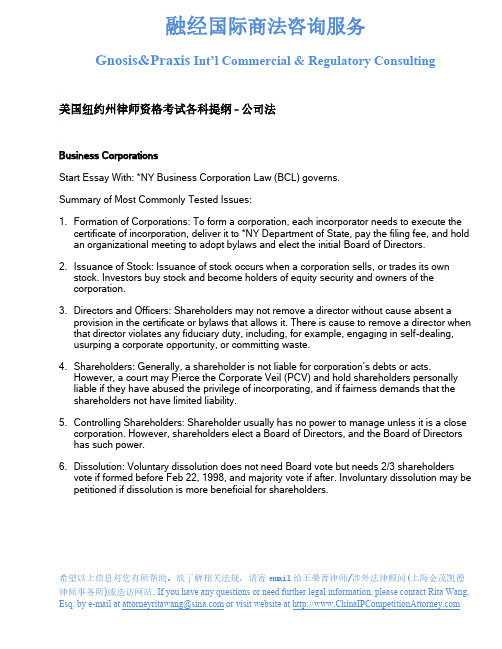
美国纽约州律师资格考试各科提纲–公司法Business CorporationsStart Essay With: *NY Business Corporation Law (BCL) governs.Summary of Most Commonly Tested Issues:1.Formation of Corporations: To form a corporation, each incorporator needs to execute thecertificate of incorporation, deliver it to *NY Department of State, pay the filing fee, and hold an organizational meeting to adopt bylaws and elect the initial Board of Directors.2.Issuance of Stock: Issuance of stock occurs when a corporation sells, or trades its ownstock. Investors buy stock and become holders of equity security and owners of thecorporation.3.Directors and Officers: Shareholders may not remove a director without cause absent aprovision in the certificate or bylaws that allows it. There is cause to remove a director when that director violates any fiduciary duty, including, for example, engaging in self-dealing, usurping a corporate opportunity, or committing waste.4.Shareholders: Generally, a shareholder is not liable for corporation’s debts or acts.However, a court may Pierce the Corporate Veil (PCV) and hold shareholders personally liable if they have abused the privilege of incorporating, and if fairness demands that the shareholders not have limited liability.5.Controlling Shareholders: Shareholder usually has no power to manage unless it is a closecorporation. However, shareholders elect a Board of Directors, and the Board of Directors has such power.6.Dissolution: Voluntary dissolution does not need Board vote but needs 2/3 shareholdersvote if formed before Feb 22, 1998, and majority vote if after. Involuntary dissolution may be petitioned if dissolution is more beneficial for shareholders.希望以上信息对您有所帮助。
- 1、下载文档前请自行甄别文档内容的完整性,平台不提供额外的编辑、内容补充、找答案等附加服务。
- 2、"仅部分预览"的文档,不可在线预览部分如存在完整性等问题,可反馈申请退款(可完整预览的文档不适用该条件!)。
- 3、如文档侵犯您的权益,请联系客服反馈,我们会尽快为您处理(人工客服工作时间:9:00-18:30)。
美国的律师资格考试
美国律师资格考试称为Bar Exam。
“Bar”是一个多义词,通常是指酒吧或是杆状物。
在法律界,Bar的意思是法庭里的那一道齐大腿高的栏板,将法官席和律师及当事人分开。
栏板中间有扇小门,若律师与法官需要直接沟通,则从小门进入。
我在1994年夏天参加纽约州的律考,那年共有7,737位考生,6,091位通过,占78.7%,其中第一次参加考试的通过率为85.6%,复考的通过率为67.6%。
纽约州每年举行两次律考,一次夏季,一次冬季,冬季的人数较少,不到夏季的一半,多为夏季没通过的参加复考。
1994年夏季的律考通过率算是高的,历年的夏季平均通过率大约为70%以下,而冬季的平均通过率在50%以下。
夏季的通过率之所以高,是因为考生多为当年夏季的毕业生,在校学的东西还没忘记,从毕业考试之后到开始工作之前,大约有三个月的时间,可以全力以赴地复习准备考试。
冬季的考生多为复考,因为第一次没通过,参加工作后无法脱产复习,所以通过率较低。
除了法律专业知识外,要通过美国的律考,考生还必须学会考试的技巧(test taking skill)。
为此,美国有许多律考补习班,如PMBR(现在叫Kaplan)、Pieper和Bar Bri等。
那些补习班通常在法学院的高年级学生中招募销售代表。
销售代表的工作很简单,只要在学校的走廊里轮流摆摊即可。
一张折叠的桌子,上面放一些补习班的材料,动员同学报名,销售代表可以免费上补习班。
当年我报名担任Bar Bri的代表,便免去了几千美元的学费。
“练摊”的另一个好处是,在上课时摊子上没有人,桌子上又有现成的复习资料,自己便可以趁机复习。
纽约州的律考分为两天,第一天考纽约州法,第二天考联邦法。
州法考试分上、下午,上午是选择题,下午是问答题,联邦法则全是选择题,上、下午各100题,必须分别在3小时内答完。
补习班的老师特别强调实战演习,平时自己练习虽然没有时间限制,但还是必须掐着表做题,目标是争取第一小时完成35题,第二小时再完成35题,第三小时完成剩下的30题。
如果第一个小时不能完成35题,第二小时想赶上是几乎不可能的,只可能慢下来,第三小时累了会更慢,就有可能做不完100题。
有的考生为了保险起见,同时报考两个州的律考,如纽约州的考生,除了纽约之外,还可以在新泽西或康奈迪克州报考。
因为全国各州联邦法的考试都安排在同一天,新泽西和康奈迪克州将联邦法安排在第一天,州法安排在第二天,这样纽约州的考生便可以第一天考纽约州法,第二天考联邦法,第三天再考新泽西或康奈迪克的州法,其中联邦法的成绩可以在两个州共用。
为了保险,我同时报考了纽约和新泽西。
第二天考完联邦法之后,便乘火车到新泽西的Somerset,住进旅馆,第三天考新泽西的州法。
第一天考纽约州法时,头脑比较清醒,还能意识到许多没有考好的地方。
因为前两天太累,第三天已经考糊涂了,出来后自我感觉非常好。
考完后我对家人说,如果两个州只通过一个,那一定是新泽西。
到发榜的时候,偏偏是新泽西先公布结果,竟然是名落孙山,把我吓坏了。
接到纽约州的通知时,我手直发抖,鼓起勇气拆开后,居然非但“一枪过”了纽约州,还因为联邦法的考分特高,免试获得了华盛顿哥伦比亚特区的律师资格,算是一场虚惊后的惊喜。
当然,如果总分没通过纽约州的律考,即使联邦法考了高分,还是不能免试进华盛顿哥伦比亚特区。
纽约州的律考分两个考场,一个在纽约市,另一个在州府阿尔伯尼,大部分的考生在纽约市。
1994年的考场设在纽约市的贾维茨中心(Javits Center),是华裔建筑师贝聿铭设计的一个大型会展中心,好几千名考生,每人一张桌子,场面非常壮观,气氛也非常紧张、肃穆。
为了防止有人代考,在报名参加律考时,考生必须在学校教务处的监督下当面抄写一段短文,另外还要留下签名,以便将来比对笔迹。
进入考场时,考生必须签名,考试当中每次上厕所,回考场必须重新签名,以防中途换人。
我有一位女同学,就住在我家附近。
法学院毕业时,她父亲送她一辆崭新的奔驰车。
当时她已经怀孕七、八个月了,上补习班时,她总是让我搭便车。
律考的第二天,中途突然听见广播,说是发生紧急情况,希望有医学背景的考生自愿帮忙。
后来我才知道,那位女同学因为考试太紧张,睡不好觉,第二天考到一半早产了,自然是没有通过,半年后考第二次才通过。
据她说,几千个考生,居然没有一个停下考试帮忙的。
(在我们的同学中,就有一位医生。
)
通过律师资格考试之后,还得经过冗长的“政审”。
候选人必须如实填写一份表格,回答许多问题,如有无犯罪记录,过去若干年的学习和工作地点,家庭住址,还得提供联系人和保荐人。
还记得宣誓那天,上百个学子聚集在布鲁克林的法庭里,纽约州律考董事会(The New York State Board of Law Examiners)的官员向法官请求批准我们获得律师资格,那位法官听完之后,绷着脸道:“What if I say no?”(假如我说不呢?)过了两秒钟,全体哄堂大笑。
宣誓的仪式便在轻松、愉快的气氛中结
束。
下面再说一些有关美国律考的轶事。
有一位麦克西•迪恩•费勒(Maxcy Dean Filer)先生,1996年获得法学学位,此后连续47次没通过加利福尼亚州的律考。
那哥们儿庄稼不得年年种,一直到1991年,第48次才通过,此时他的两个儿子都已经是律师了。
约翰肯尼迪总统的儿子,小约翰两次没有通过律考,当时他在纽约当助理检察官,被警告如果再不通过便要炒鱿鱼了。
第三次他的补习老师是Kaplan补习班的 Joseph Marino,采取一对一的方法。
据说小肯尼迪特别贪玩,于是他把这位身份特殊的学生“软禁”在家,吃饭都是叫外卖送到家,深居简出地复习了两个月,总算第三次才通过。
如此吃小灶,想必收费不菲,得好几万美元。
美国的第一夫人米歇尔•奥巴马毕业于哈佛大学法学院,第一次没有通过伊利诺伊州的律考。
在美国,伊利诺伊州的律考被认为是最容易的之一。
本杰明•卡多索(Benjamin Cardozo)是美国法律界的泰斗人物,15岁便考入哥伦比亚大学法学院,曾
担任纽约上诉法庭的法官和最高法庭大法官,但是第一次却没有通过纽约州的律考。
前第一夫人、参议员、国务卿希拉里,毕业于耶鲁大学法学院,但是没有通过华盛顿哥伦比亚特区的律考,后来通过阿肯色州的律考。
芝加哥市长理查德•戴利(Richard Daley)、洛杉矶市长安托尼奥•维拉瑞格萨(Antonio Villaraigosa)和纽约市长艾德•考奇(Ed Koch)都曾在律考中名落孙山。
加利福尼亚州长杰瑞•布朗、新泽西州长皮特•威尔逊和纽约州长戴维•帕特森也有过律考不及格的历
史。
美国律考的通过率远远高于中国,原因很简单,美国的律考资格门槛较高,必须具有法学博士(J.D.)或硕士(L.L.M.)学位,而根据中国《律师法》第六条有关法官、检察官任职和取得律师资格的规定,考生仅需具有高等院校法律专业本科以上学历,或者高等院校其他专业本科以上学历,并具有法律专业知识即可。
因为中国参加律考的相对人数多,所以通过率通常是在个位数徘徊。
我认识不少中国政法学院和法律系的学生,有的一次没有通过律考,便非常沮丧。
其实胜败乃兵家常事,应该学习那位锲而不舍,连考48次的费勒先生,多考几次,一定会通过的。
